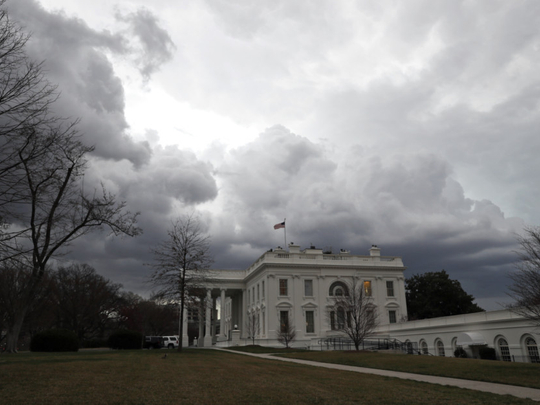
Whenever you’d interview United States President Donald Trump supporters during last year’s election campaign, one line would come up more than any other: “He’s a successful businessman,” they’d say, “and it’s about time someone ran the country like a business.”
If those voters were expecting Trump to steer the US government with technocratic efficiency, they will have been disappointed by the performance so far. Of course the president himself insists it’s running like a “fine-tuned machine”, but the resignations, leaks, unfilled posts and overturned executive orders suggest a rather less sleek operation.
Still, none of that seems to matter much to Trump’s base who, polls show, are sticking loyally to their man (partly because they simply don’t believe the reports of his serial failures). But now comes the big test of Trump’s promise to act like an incoming CEO and get a grip on USA Inc: His first budget. This is what Trump was hired to do, to cut waste, to get more for less, to make the smart decisions that somehow eluded decades of useless Washington politicians.
Will it surprise you to hear that the early signs point to a budget that is anything but smart — that is, in fact, short-sighted, dumb and self-defeating?
The core proposal is for a massive increase in defence spending, with Trump seeking an extra $54 billion (Dh198.61 billion) for tanks, ships and weapons systems. The money will come from cutting — “dollar for dollar” — spending on foreign aid, diplomacy and environmental protection. The myopia of that decision is astonishing. The US already spends more on defence than the next eight biggest defence-spending nations put together. The US enjoys “full-spectrum dominance”. It has a nuclear arsenal capable of destroying all human life on the planet many times over.
Yet, apparently that’s not enough. Last week, Trump told Reuters he believed the US had fallen behind in its nuclear capacity and he wanted to make it “top of the pack” — as if the US is not already at the nuclear summit and out of sight.
What makes this shift so misguided is not just the piling of excess upon excess, but the opportunity cost — paying for all this hardware by depleting the arsenal of US soft power. Trump’s plans call for a 30 per cent cut in the US State Department’s budget, with reports of a 40 per cent cut in US contributions to international agencies, such as the United Nations, and a 25 per cent cut in funds for the Environmental Protection Agency (which is already saddled with a boss who doesn’t believe human-made climate change is real). It’s as if Trump decided that the best way to protect his buildings and hotels would be to spend millions on shiny new fire engines — and rip out all the smoke detectors.
That’s certainly how those with military experience see it. Hence the letter from 120 retired generals and admirals, urging Trump and the US Congress not to reduce the money available to diplomacy and aid. They quoted none other than Trump’s own Secretary of Defence, James Mattis, who said in 2013: “If you don’t fund the State Department fully, then I need to buy more ammunition.” Mattis understands what the president he serves does not: That diplomacy and international cooperation are the smartest form of military spending — because they reduce the likelihood of ever having to use all that expensive, and lethal, equipment.
Now it will fall to Mattis and the other generals in key positions in the Trump administration to fight this deeply dangerous policy shift. Like most who’ve worn their nation’s uniform, they see war as a last resort, to be approached with no relish. But they work for a chicken hawk president, who avoided military service by claiming “bone spurs” in a foot — though he later couldn’t remember which one.
Trump says he wants America “to start winning wars again”. His first budget will certainly make it more likely that America will start fighting wars again — but that is hardly the same thing.
— Guardian News & Media Ltd
Jonathan Freedland is a columnist and writer for the Guardian.










